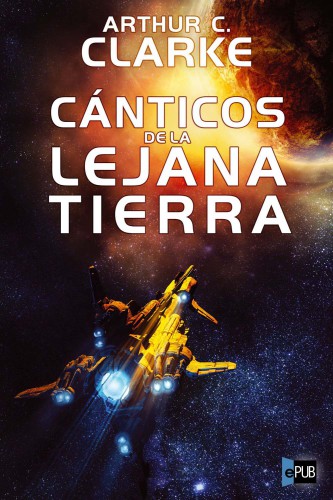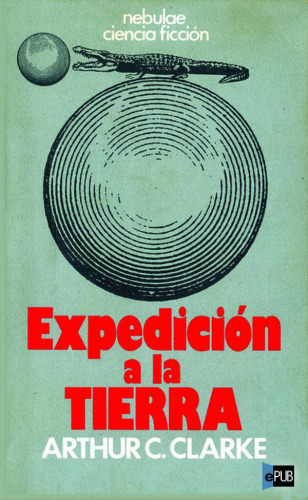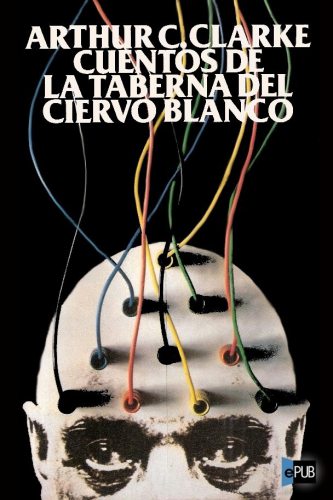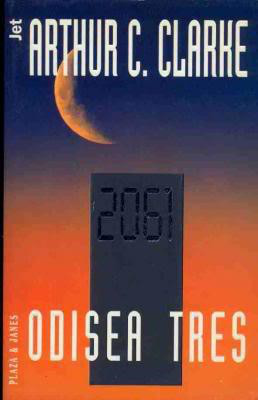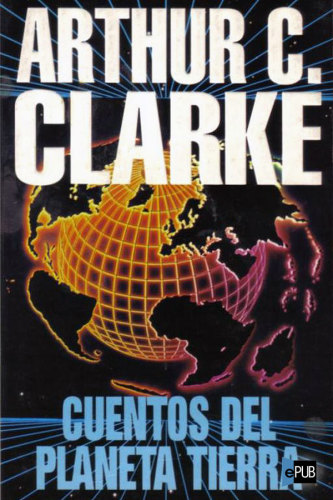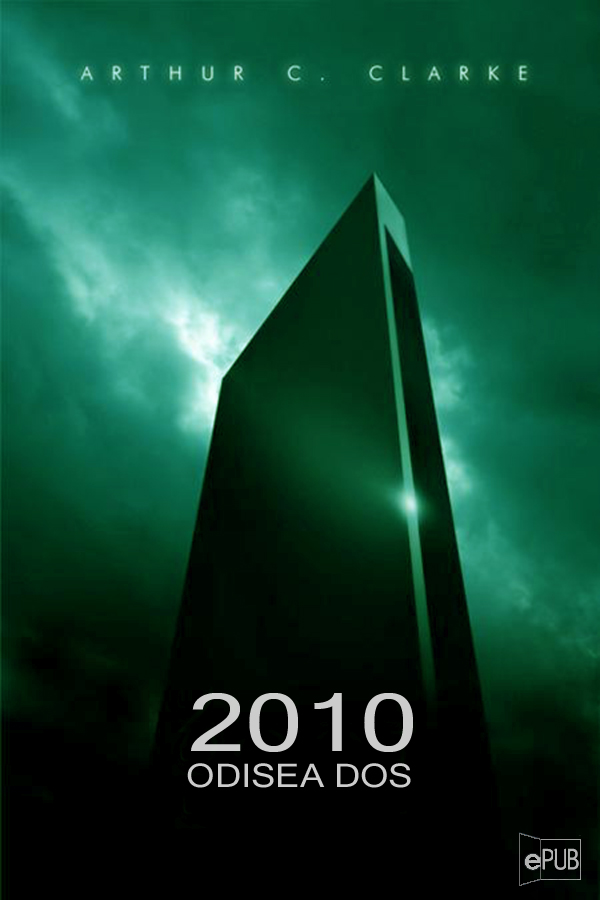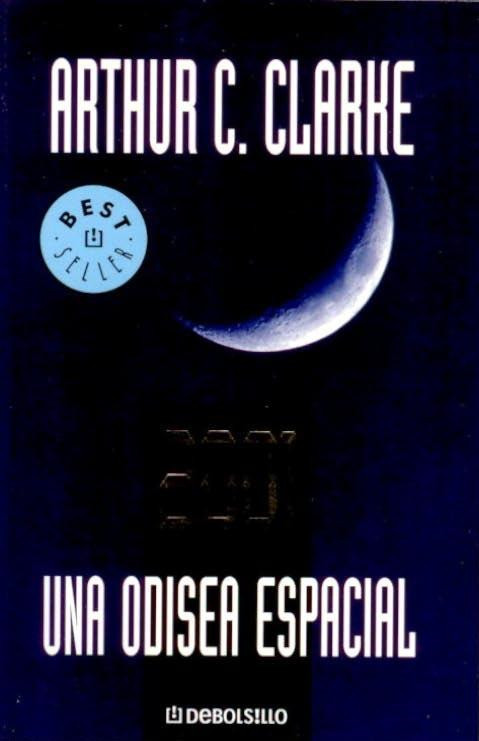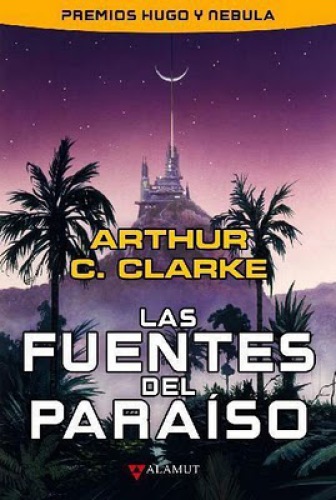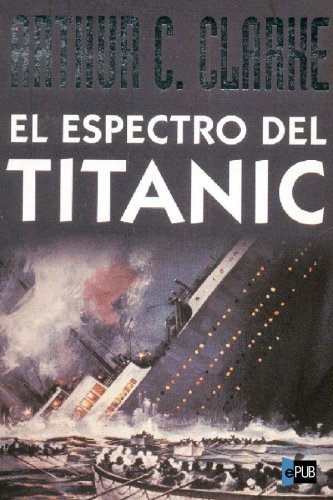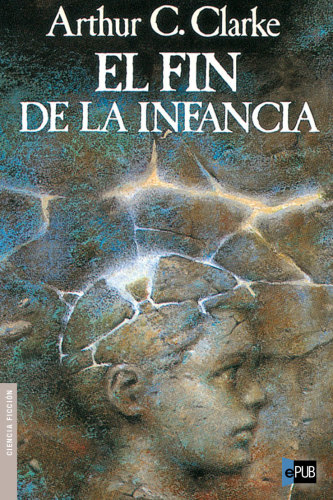oleebook.com
Fuentes del paraiso de Clarke, Arthur C
de Clarke, Arthur C - Género: Ficcion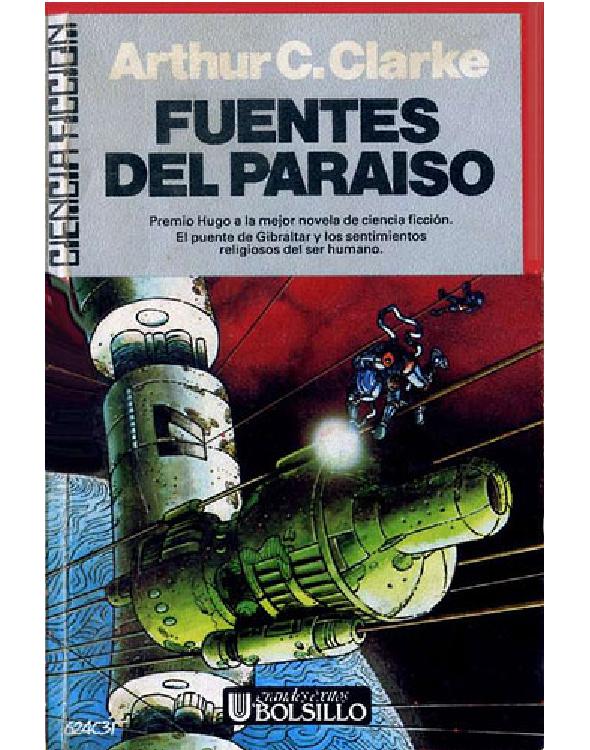
Sinopsis
Arthur C. Clarke enfoca en esta nueva novela, una vez más, un tema que le obsesiona y que le ha inspirado algunas de sus más grandes obras, como Cita con Rama y 2001, Odisea en el espacio. Se trata de una paradoja. El hombre es más hombre cuanto más desafía las leyes de la naturaleza, pero, ante la grandiosidad del universo, todas las creaciones del hombre se ven empequeñecidas a largo plazo por el trabajo de los demás. El protagonista se llama Vannevar Morgan. Es un genial ingeniero del siglo XII que ha construido un audaz puente hasta las estrellas. Un "ascensor espacial" o "torre orbital", de cuarenta mil kilómetros de altura, deberá unir un punto del Ecuador con un satélite en "órbita estacionaria". Pero queda un obstáculo. La mejor plataforma de lanzamiento posible es una montaña sagrada, habitada por monjes desde tiempos inmemoriables.
Libros Recomendados - Relacionados
Reseñas Varias sobre este libro
SF Masterworks #34 - Clarke does it again! This is the third SFmasterworks by him I have read, and once again I was totally immersed in a future reality that was so complete, so real, so well thought out.. so good!
Visionary engineer Vannevar Morgan wants to build a 'space elevator' that would enable very affordable transport of cargo into space and beyond. For any normal writer that's enough of a story, but Clarke adds in complications of political considerations, a historic site, religion and personal differences. He turns a future story of an innovative engineer into the story of a 22nd visionary pushing at, and test the status quo of his 22nd century reality Smashing! Super! 9 out of 12.
2020 readsci-fi-beam-me-up sfmasterworks136 s Ahmad Sharabiani9,564 7,526
The Fountains of Paradise, Arthur C. Clarke
Characters: Vannemar Morga
Abstracts: Vannemar Morgan's dream of linking Earth with the stars requires a 24,000-mile-high space elevator. But first he must solve a million technical, political, and economic problems.
????? ?????? ?????: ??? ??????? ??? ?????? ??? 1978??????
????? ??: ???? ??? ????? ???? ???? ????? / ????? ??. ?????? ?????: ???? ????? ???: ?????? ??? ????? ??? ???? ??? 1357? ??? ??? 1380? ?? 309 ?.? ??????: ?????? ???? ???? - ??????? 10? ???? ????964674222? ????? ????: ????? ??? ????? ????? ????????? ???? ????? ?? ????????? ??????? - ??? 20?
??????? ???? ????? ?? «????? ?? ?????»? ?? ?? ???? ? ????? ?? ???? ??????? ?? ?????? ?????? ?? ????? ?? ????? ? ????? ?? ?????? ?? ??? ???????? ?? ?? ??? ??? ????? ????? ???? ????? ?????? ??? ?? ??? ?? ??????? ???????? ????? ??????? «????????» ???? ?? ?? ??? ?? ?? ????? «????»? ?? «????????» ?????? «????????» ?? ??????? ????? ? ??? ???? ??????? ?? ??? ? ???? ? ??? ?????? ???????? «????????»? ?? ??????? «????????»? ?? ?????? ??? ?? ??? ?????? ? ??? ?? ????? ?? ??? ?? ????? ?????? ????? ?? ???? ????? ?? ?????? ??????? ??????? ??????? ?? ?? «?????? ???????»? ????? ????? ?????? ?????? ?? ?? ?? ?? ?????? ?? ????????? ?? ???? ???? ???? ?? ??????? ? ????? ?? ?? ??? ???????? ??? ????? ???????? ???? ????? ?? «????????»? ??????? ???? «????????» ???? ?????? ?? ?????? ??????? ? ?????? ???? ???? ?? ???? ??? ??? «????? ??????» ??? ????? ??????? ???? ?? ?? ???? ??????? ? ???? ????? ???? ?????? ??? ?? ?????? ?? ???????? ?? ?? ??? ????????? ???? ??? ?? ?????? «????????» ????? ???? «????????» ?????? ?????? ????? ??? ????? ????? ? ????? ??????? ?????? ??? ?? ?? ????? ??? «??????? ?????» ???? ??????? ???? ??? ??????? ??? ???? ?????? ????????? ?? ??? ??? ?????? ? ????? ?? ????? ???????? ????? ??? ?? ????? ?? ?????? ??????? ????? ????????? ???? ??????? ? ???????: «??? ??? ??????? ??? ???????? ??? ????? ???? ?? ???? ?? ?????? ??? ??? ?? ??? ???????? ????? ??? ????»? ????? ????
????? ? «??????? ?????»? ?? ??? «?????» ????? ??? ???? ??? ?? ????? ???? ??? ?????? ?? ??? ????? ??? ???? ???? ????? ?? ?? ??? ??? «?????»? ?? ????? ? ???? ??? ??????: «??? ????? ????? ???? ?? «???? ?????» ? ?? ????? ??? ?????? ??? ????? ??? 1966?????? ???? ??? ??? ?? ?? ????? ????? ??? ?? (????? ????)? ?? ??? 1960??????? ?? ?????? ?? ???? ???? ?? ??????? ???? ????? ?? ??? ?????? ??????? ?????????? (????- ????)? ? ??????? ??????? ?? ??????? ????? ????? ???? ?? ???? ???? ???? ??? ? ????? ???? ??? ????? ???? ??????? ?? ??? ?????? ???? ??????? ?? ??? ???? ?? ???? ?????? ?? ?????? ????? ?? ??? 1976??????? ???? ?????? ?? ?????????? ???? ????? ???? ?????? ????? ?????? ?? ???????? ?? ??? ???? ????? ????? ???? ?? ???? ????? ??? ????? ??????? ????? ? ??????? ? ???? ???? ????? ??? ? ??????? ?? ??? (????- ????) ????? ??? ?? ??? ???? ???? (????????) ??? ????? ???? ?????? ??? ????? ???? ?? ???? ??????? ????? ???? ? ??????? ???? ???? ??? ???? ?? ?????? ??? ?? ????? ?? ????? ???? ???????? ????????? ??? ???????? ?? ????? ??? ???? ???? ???? ????? ?? ?? ?? ??? ?? ????? (????????) ?????? ??? ?? ???? (?????? ???? ???? ????)? ????? ????? ???? ???? ???? ?? ????? ???? ? ?? ???? ? ?????? ??? ???? ???? ?? ?? ????? ????? ???»? ????? ??? ?? ????? ????
----
1 Kalidasa - ????????
2 Ranapura - ????????
3 ????????: ??? ???? ???? ????? ?????? ??? ?? ???? ??? ???? «???? ????? ?????»? ?? «????????»? ?????? ???? «????????» ?? ???? ??? ? ???? ?????? ??? ? ???? ???? ? ???? ???? ? ?????? ??????? ??: «??-???-?-??» ???????? «??????» ?? ???? ????? ?? «???? ?????» ????????: «?? ???????? ? ??? ????? ???? ? ??????? ????? ???? ????????...» ????? ?? ?? ???? ????? «???????» ????
??? ?? ????? ???? ??? ??? ???
4 yakagala - ????????: ????(????) ???? ????? ?? ???? (????) ???
5 Serkanda - ????????
6 Vennevar Morgan - ????? ??????
????? ?????? ????? 19/07/1399???? ???????? ?. ??????? Lyn1,909 16.8k
First published in 1979, Fountains of Paradise is one of Grandmaster Sir Arthur C. Clarkes later books, but in its themes and style is reminiscent of some of his best work.
Telling the story of an elevator into space, this also describes a flashback related story thousands of years earlier as a Sri Lankan king builds a palace high on the mountain top. Both celestial projects stretch the limits of human achievement and engineering ability and Clarkes unique talent ties the two stories together.
Much of the narrative is devoted to explanations of the problems and obstacles to overcome for such a marvel of technology and engineering. Clarke also sets this in the near future and describes other preeminent projects a bridge across Gibraltar. Essentially, this is a filament tether connecting the mountain top to an orbiting satellite and we can easily transport people and supplies hundreds of kilometers into low space. Clarkes scientific imagination and vision are again on exhibition. This one also features better characterization than what we usually expect from him.
Recalling his other works Rendezvous with Rama and Childhood's End, this also made me think of Poul Andersons 1983 publication Orion Shall Rise.
Good SF, this won both the Hugo and Nebula.
53 s Matt216 703
I was disappointed in this book, though I confess that part of it is my fault. Clarke didn't tell the story that I wanted him to tell, and this is always an unfair expectation on the part of the reader. "If you want a particular story, you should write it yourself." is the rightful reply of the writer. But I'm only human, and when I get figs when I was expecting chocolate, I'm disappointed (even if I figs, which I do).
'The Fountains of Paradise' is about mankind's first attempt to construct a space elevator. It would perhaps be more precise to say that it is about one man's attempt to construct a space elevator, as Clarke suffers from his usual failing of trying to tell grand world transforming stories from the viewpoint of a single individual who has limited social interaction. The result is that the largest enterprise ever undertaken by man is made to feel it's a small business with perhaps five employees.
But that would not have particularly disappointed me had not the whole matter been made to seem so easy. One of my particular and growing pet peeves is science fiction that makes the conquest of space seem it ought to be a trivial matter. I'm increasingly of the conviction that science fiction - which had been and ought to still be at the forefront of encouraging us to set our sights on the heavens, grow up, and leave the nest - is instead becoming a hindrance to us. We are increasingly becoming content with shoddy poorly realized visions of the stars that serve to make the real painful and difficult work of space exploration seem just that much less attractive. In the stories, it is always so easy. We flit across the unimaginable gulfs between stars not with the comparative ease with which we crossed the oceans (much less a real sense of the difficulty involved), but with the ease that we drive down to the corner convenience store. If it seems hard to get from here to there, we find alien artifacts that do the hard work for us. If we despair at our ability to cope, well then we are uplifted from our ignorance by passing benevolent alien patrons. We break the laws of physics with the power of plot, and we settle into the easy fantasies of human hubris rather than face up to the immensity of Old Man Space with some sort of maturity.
Part of the problem is that only the last one third of the book actually concerns the construction of the space elevator. By the time the construction of the space elevator is really joined, its completion is a foregone conclusion and the great problems are dispensed with off stage in favor of smaller scale and more personnel tragedies and triumphs. It is as if the project the artist has conceived is too grand of scale for his imagination, and so he deals with something that isn't. The result ends up seeming less grand than even, for example, the story of the laying of the first transatlantic telegraph cable.(For example.)
But the biggest disappointment is that the first two thirds of the book don't deal directly with the construction of the tower at all, but instead deal with the protagonist's struggle to obtain permission to build the space elevator on land currently occupied by an unwilling Buddhist monastery. This part of the story is more engaging than the last third but ultimately Clarke forces it to resolve down to just another story about the supposed conflict between reason and faith. Despite the fact that these first 200 pages have the structure of a good 20 page short story, they would make for pretty good reading in Clarke's capable hands except that in the midst of this he finds himself unable to avoid picking up the trite hammer to nail his point home.
Given how I've already confessed that I hoped this would be the story of the titanic struggle to conquer near space, you can perhaps imagine my dismay when Clarke trots out that most tired of easy sci-fi escapes - the Alien Messiah. Interspersed with this conflict between reason and faith in the form of the passively truculent monks standing in the way of human progress, Clarke adds an utterly unnecessary plot element of an alien visitor who is made to represent the last word in this metaconflict. Exactly why Clarke thought the story was well served by such a ham-handed device, I'm not sure because without it I think the story and the conflict is more thought provoking and its precise meaning more difficult to tease out. I will grant that as Alien Messiah's go this one is pretty original and well disguised. Instead of an actual alien, it's the AI of survey probe of alien manufacture. And it does not in fact bequeath the usual super-science on the otherwise helpless mankind and thereby usher in an age of peace, abundance, and justice. However, other than that it's a pretty typical Alien Messiah that saves mankind from itself and I was hoping at the outset that we could perhaps for once have a story without the intervention of a super-alien at all.
In this case, the salvation takes the form of eliminating all religions from the Earth. Instead of bestowing on mankind the usual technological wisdom, it dispences philosophy.
I kid you not. Arthur C. Clarke - avowed atheist - imagines an alien from on high come to Earth and pronounce in its irrefutable superhuman wisdom, that Arthur C. Clarke has been right all along and all religions are hooey. Now who could have guessed that twist? It's such a jarringly humorous and incongruous episode in the middle of the rest of the story that I really didn't know what to make of it. Is Clarke trying to be nasty here? Or, is he trying to make a joke? Is he convincing himself, or does he have some motive for deliberately advancing an extremely weak argument involving among other things the misuse of Ockham's razor, a failure to really consider the different role of infinite and finite numbers, a red herring, and a failure to consider the cosmological and theological import of the big bang?
Whatever Clarke's larger intent, within the setting Clarke's technological prophet is taken with such seriousness that we are told virtually all religious belief ceases and human spiritual activity reaches an atheistic eschaton. Just that, a new age dawns. Exactly why the unambiguous refutation of Thomas Aquinas would accomplish this is not really addressed, but for me as a computer scientist it does raise an interesting question of the presumed sophont class of the probe in question that it was able in under an hour to exceed the mental activities of "billions of words of pious gibberish with which apparently intelligent men had addled their minds for centuries." That is a god- intelligence indeed! As Clarke puts it, "For the first time we knew what we'd always suspected, that ours was not the only intelligence in the universe, and that out among the stars were far older and perhaps far wiser civilizations."
And if Clarke's imaginary alien probe doesn't convince you that super-wise aliens will come along and usher in paradise on this Earth, well just what would? When I started the book I was most afraid I would be annoyed with the rampant use of unobtanium and handwavium in the construction of the space elevator. Little did I realize that the unobtainium in the elevator filaments would pale in comparison to the unobtainium in the philosophical constructs.
Still, for all that Clarke's digressions may annoy (or may stimulate depending on your philosophical inclinations), the first two thirds is still a good story. It's so good that when Clarke wraps this first story arc up, the remaining novel seems anticlimactic. The first part is so much better and more fully conceived that it as if the second shorter story arc is tacked on to fill out the story to a more respectable length. Much as I wanted the story to be about the second part, Clarke didn't seem to know what to do with it. So, in the end I got a good story, but it was far from the one that I wanted.science-fiction45 s Clouds228 637
Following the resounding success of my Locus Quest, I faced a dilemma: which reading list to follow it up with? Variety is the spice of life, so Ive decided to diversify and pursue six different lists simultaneously. This book falls into my HUGO WINNERS list.
This is the reading list that follows the old adage, "if it ain't broke, don't fix it". I loved reading the Locus Sci-Fi Award winners so I'm going to crack on with the Hugo winners next (but only the post-1980 winners, I'll follow up with pre-1980 another time).
Quick - write a review before the toddler gets home!
So... The Fountains of Paradise wasn't what I was expecting. I'm not quite sure what exactly I was expecting, because I'd never read anything by Arthur C Clarke before, but Space Elevators are a staple of space-opera, a sub-genre I'm particularly fond of - so I guess I was expecting more... melodrama?
I said (repeatedly) in my comments while reading that this story is measured, peaceful, even Zen. Now, while I did enjoy those aspects, I didn't find them terribly gripping. Despite the wonderful engineering feat described, I never felt riveted (please excuse the terrible pun).
For anyone ( me) who doesn't know much about this book:
The story is about the greatest engineer of his generation, Van. His masterwork to date was the Gibraltar bridge, so huge it's simply referred to as The Bridge. Now he's got plans for an even bigger bridge - a bridge to the stars - in the form of a space elevator. The only mountaintop site on Earth suitable for this incredible project is already occupied... by an ancient Buddhist temple. The story follows how Van comes to evict the tenants, and then later his involvement in a rescue mission during the construction of the elevator.
We also get a flashback to some ancient history around the location of the elevator, and a flashforward to mirror the distant future when the elevator is, itself ancient.
So, what's to ?
It's accessible - the language, structure and characters are all easy to grab hold of. It's a quick read - it's not a big book. The pure love of engineering, and passion for the idea of a space elevator evident is interesting, powerful, and charming. The tone throughout is mature; thoughtful, contemplative and peaceful.
It's kind of a charismatic lecturer using an engineer's biography to try and get students to relate to the real-world issues around major projects. Not entirely successful, but you appreciate the effort.
And what's not to ?
The story is interesting, but not 'dramatic' in the traditional sense. Van has no close friends or family. Nobody's life is at risk if his project doesn't get off the ground. It's a fight for an idea... a wonderful idea, but there's no heart-and-soul at stake. The plot is broadly bisected into getting the project started, and the rescue mission. The first challenge is overcome via a deus-ex-fluke. The second has the potential for great heart-string drama, but ducks every bullet - the victim being rescued is not someone we care about, the method of rescue is mostly routine and sedate, the moments of crisis en-route are solved logically and methodically, and the final climax is one of peaceful acceptance... I applaud the mindset of Van throughout these trials - but his careful competence does suck the risk-factor out of the equation. This is Van the man, he gets the job done, now let's look at the scenery...
As a far-future tale, this feels dated. Apart from the crystal-nanowire the Elevator is built of, there's very little development out into broader technological/social/political progression. This feels the 80s... with a space elevator.
...And the final score?
I was torn between 3 and 4 stars... I definitely 'd it' but I didn't 'really it'. At no point was I not enjoying The Fountains of Paradise, but the overall experience lacked ooomph. In the end I settled on 3 stars because I just didn't have the conviction for 4.
Not a bad introduction, I think, to Arthur C. Clarke.
In no way has it put me off reading more when the opportunity arises.
What would you compare it too?
Hmm... tough for me because I don't read much from that era. Asimov is the only peer I've read, and they certainly have some stylistic elements common. Some similarities to Larry Niven too. A modern writer in the same headspace may be Greg Egan?
P.S. - why is there no proper cover for this book? only a photo of a book at a weird angle..? - Huzzah! Librarian David has now fixed this - thanks.
After this I read: Q Pootle 5hugo nebula pub-1970s ...more41 s Matt (Fully supports developing sentient AGI)88 24
Sir Arthur C. Clarke introduces the world to the concept of the space elevator in The Fountains of Paradise. The story itself concerns the technology, process, and obstacles to building this megastructure, with a parallel story in the distant past of earthbound building projects on the future proposed elevator site.
Overall, entertaining, but surprisingly light on the politics necessary for any project this massive and expensive, so today it seems a bit naive. Also, the bonus first contact story was interesting but unnecessary.35 s2 comments Timothy Urgest535 360
Vannevar Morgan, the Chief Engineer of the Terran Construction Corporation, dreams of building a bridge that links Earth to the stars. The space elevator is preferable over rocket travel because it is less expensive and less damaging to the environment.
A mountain on the island of Taprobane is the only location capable of holding the elevator, and that location is currently inhabited by Buddhist monks that have no desire to leave. Morgan must convince or coerce the monks to leave in order to fulfill his dream and build a bridge to the sky.
The Fountains of Paradise is about the impermanence of religion, achievement, and life; but also about perseverance and thriving against impermanence. This book is deserving of the Hugo and Nebula Awards that it received. 30 s Stephen1,516 11.6k
4.5 to 5.0 stars. Definitely one of Clarke's best novels, which is saying something given his tremendous body of work. The novel, as most of Clarke's work, was respectful of the scientific basis required for the story but never let itself get bogged down in overly long technical explanations. A superb story that once again reaffirms that man can do just about anythign if he sets his mind to it. HIGHLY RECOMMENDED!!
Winner: Hugo Award for Best Science Fiction Novel (1980)
Winner: Nebula Award for Best Science Fiction Novel (1980)
Nominee: Locus Award for Best Science Fiction Novel (1980)
Nominee: British Science Fiction Award for Best Novel (1980) audiobook award-nominee-british-sf award-nominee-hugo ...more25 s Scott302 343
Space Elevators. Elevators that take people from the surface of Earth all the way across thousands of kilometers to orbit.
Sounds fun yeah?
Not to me.
To me it sounds spending twenty hours packed into a crowded and fart-infused metal room, trying to avoid eye contact while enduring an unending audio loop of Top Twenty Chart Hits - Pan Pipe Interpretations.
Yet while the term 'Space Elevator' doesn't exactly drip with excitement, Clarke, in his skilled way, spins an engaging and entertaining (if at times a little dry) story. The Fountains of Paradise neatly juxtaposes the attempts to build humanity's first space elevator with the Sri Lankan Empire of the cruel king Kalidasa, a usurper of the Sri Lankan throne who during his rule built a pleasure palace whose beauty challenged that of heavenly paradise (the fountains in the title refer to the water gardens in the palace).
Set in a semi-fictional Sri Lanka (here known as Taprobane), the story mainly concerns Vannemar Morgan, a world renowned engineer, and his attempts to get support for an audacious project- the linking of Earths surface to orbit via a near monomolecular diamond cable, a cable that will allow for freight and people to be taken to orbit without the use of expensive rocketry.
Clarkes fictional Sri Lanka, being close to the equator, is a natural spot for such an elevator, and the mountain known as Sri Kanda is by virtue of its height and location the best place on earth to connect the cable.
There is however, one problem. At the summit of the mountain sits a Buddhist monastery, a sacred site that has been occupied for millennia. The buddhist monks, and their abbot Venerable Bodhidharma Mahanayake Thero are not for budging, and will not allow the elevator to be built on their mountain. Morgan must fight both their intransigence, and the monumental technical problems he faces in building a structure tens of thousands of kilometres long.
The sections concerning the King Kalidasa and his palace are great. Clarke spent many, many years in Sri Lanka (An older colleague of mine who lived there used to see him wandering the beaches near Colombo) and he brings its history and environment to life.
As King Kalidasa builds his palace the Buddhist monastery on the peak nearby is ever present. The disapproval of the monks and the influence of their spiritually powerful leader perpetually hangs over Kalidasa, nicely echoing their influence over Morgan and the space elevator in the future.
While the historical sections brim with life, however, the sections concerning Morgan are a little less exciting. Towards the end I found myself skipping ahead to see if the ill fate that Clarke had telegraphed for his protagonist early in the book was as I suspected. It was, and I was disappointed that his character arc was so obviously inevitable.
Oh, and did I mention that first contact with aliens has already occurred in Clarkes universe? An epoch defining event discovering other intelligent life (or in this case, them discovering us) would seem to deserve more than a mention, but it barely influences the narrative at all, or the motives of the characters, and seemed to me to have been included solely so that Clarke could include an interesting coda at the books end from centuries after the central events in the novel.
The far-future coda did wrap things up nicely however, even if it seemed a little tacked on. Overall this was an engaging, but not spectacular story that despite its flaws made spending tens of hours watching numbers slowly creep up on an space elevator floor counter seem more exciting than I had initially expected.
Three stars.science-fiction22 s BradleyAuthor 4 books4,324
Where I've recently read one or two Hugo-winning novels recently that I may or may not have exactly wished were winners, I have no qualms in announcing that this 1980 winner is a real winner.
It's a true pleasure to read on several levels. While the official "story" sometimes feels a bit tacked on and ethereal, the themes and the characters and the science is all top-shelf goodness.
The themes and feels are well known for fans of A. C. Clarke. He has a serious devotion to space elevators, the reduction in superstition and religion, a truly hopeful outlook on life, and a serious devotion to space elevators.
The characters here are especially awesome. Ram is the eternal can-do man, the scientist-engineer hero that battles technical issues, economists, politicians, pop scientists, and sheer bad luck. Sometimes this hero arc is an old cliche in SF, but here, I felt none of it. He was a real joy to follow. Even better was place and history AS character, with ancient mountain palaces, kings, and the weight of time and even the help of religion, leading to the final foundation of this admittedly awesome space elevator. We were able to revel gloriously in setting and history as the novel built up to the crescendo within "The Stairway To Heaven". This is theme and novel structure firmly in control of a master storyteller, and I am giddy even now just thinking about it. :)
But never fear, if you're worried that nothing much happens, because the novel is full of ideas and conflict of an intellectual and engineering perspective. A robot probe sent from an alien race comes and tells us that we're idiots, which should come as no surprise to anyone reading this review, but more importantly, it serves as a very smart impetus for us to get off our asses and solve our problems before we get the "real" introduction to the galactic races. Yay! If only I could wish for such a fortunate event for us!
The novel ends on some pretty cool action, in case you adrenaline junkies were wondering, but this novel is not really one of those novels. It's a smart and gorgeous growth and maturation of a grand Space Elevator and everything that it means for us. As a goal, there are few realistic short-term goals as beautiful or useful.
I loved it, and saw in retrospect that this novel is one of the primary conversations in hard science SF through the years. Kim Stanley Robinson continues and responds to this novel directly in his Mars trilogy. Stephen Baxter gives great nods to it. It's still a dream for us all. Me too.
We really shouldn't forget one of Asimov's old axims... don't put all your eggs in one basket.
Let's get out there, people!sci-fi science55 s Althea Ann2,239 1,103
When I was a kid, Arthur C. Clarke's 'The Fountains of Paradise' was one of my favorite books. I must've read it more than half a dozen times, checking it out from the library. The book has to do with the creation of a space elevator, and though I haven't read it, now, in over 30 years, I remember it dealing beautifully and sensitively with the conflicts between traditionalism and social and technological progress. It follows one scientist's 'impossible dream' to fulfillment, and although the ending is bittersweet, it is full of optimism: of the belief that innovation will truly make our world and our lives better, and that one brilliant person can, at the end, make a difference.
21 s MannyAuthor 33 books14.8k
Arthur C. Clarke once wrote a rather dull short story, which just happened to suggest the idea of geostationary satellites over 20 years before there were any. This is a rather dull novel, which presents a detailed plan for building a space elevator.
Well, I hope history repeats itself...
science-fiction21 s ???????? ????????530 74
??????? ?????? ??????????! ????????? ?? ??? ? ????? ??????????? ??????? ?????, ? ? ??? ????????? ?????? ????? - ?????????? ??????? ??? ??????. ?????????? ?? ??????? ? ???????? ??????, ? ????? ???????????? ? ????? ??-??????????, ? ? ???? ???? ? ????????????...
?????? ? ?????????? ?????? ?? ?????????????????? ???????????? ????, ???????? ?????? ? ??????, ?? ???? ??????? ?????????? ?? ???????? ????, ?? ????? ? ????? ?? ???? ?????? ?? ???? ??. ? ?? ? ?? ??????????? ?? ?????????? ????????, ????? ?? ???? ?? ??????? ???? ? ?????? ? ??????... ? ????? ??? ???? ?? ?? ???? ? ? ???????? ?? ??????????? ?? ???? ??? ????????. ?????? ????????, ????????? ?????, ?? ????? ?? ???????? ???? ??????????????? ??????, ? ???????? ??????????. ???, ????? ???????????, ?????? ???????? ? ???????? ?????? ??????? ?? ???, ? ??? ??? ????????? ?????? ?? ?????? ???????? ?? ?????????? ???????... ?? ???? ??????? ?? ?????? ????? ????? ????? ?? ? ????????? ?? ???????? ?? ??? ?????, ? ????? ? ????? ????? ??????. ? ??????? ??????? ??? ????????? ??????, ???? ?????? ???????? ???????????, ??????? ?????????? ?????? ????? ? ?????. ????? ??????, ????? ?????????? ?????????? ? ????????? ?? ??????? ? ????? ?? ????????...17 s Paul2,306 20
A truly breathtaking work of speculative fiction; the scenes set 400km above the Earth's surface actually triggered my vertigo at one point! Clarke's imagination is nothing less than visionary, all the moreso as it is based in real hard science. Astonishing and highly recommended to fans of hard SF (the climax might even appeal to the Space Opera crowd).books-read-in-202018 s Jon Adcock179 37
I've been a sci-fi fan from as far back as I can remember and I've read the major works of most of the better authors over the years. However, I bought this book years ago and, for some reason, it's sat languishing on my bookshelves, unread and getting dustier by the year. The book won the two major sci-fi awards, the Hugo and the Nebula, back when it was published in 1979, but the cover blurb never grabbed my interest enough to read it over the years.
So I finally got around to reading it and was pleasantly surprised. The book takes place in the early part of the 22nd Century and deals with the attempt by an engineer, Vannevar Morgan, to gather support and financial backing to build a space elevator, a giant structure that rises from the ground and links to a satellite in geostationary orbit 22,000 miles from the surface of the Earth. Once built, payloads could then be lifted to orbit at a fraction of the cost of using rockets.
To be honest, at first the book was a little slow moving as it detailed the political maneuvering to gather support for the project and to secure the ideal place to anchor it to. I will give Clarke kudos for not getting too bogged down in the technical details of the project. I've read a number of hard science books where the author has been so enamored with the technology he's describing that the book eventually becomes mind numbing from all the tech babble. Clarke keeps it simple and gives enough details to make the project sound feasible without overwhelming the reader with tech. The pace definitely picks up in the last sections of the book and I couldn't put it down.
The characterizations are good and I eventually found myself liking the characters and being interested in what happens to them.
The book has also aged well and there are few anachronisms in it. Most of books written before 1990 didn't anticipate the explosion in information technology that occured and you'll often find characters in some of those books still buying print newspapers or even using typewriters in what is supposedly the 21st century. There's nothing as glaringly out of place in this book.
The book is also very optimistic (and perhaps a little naive). No wars are occuring and religious strife has been eliminated in Clarke's future vision. Mankind is getting along with each other and expanding throughout the solar system with it's sights on the stars. It's a nice thought that we could get it together within 100 years.
15 s Adrian596 228
Where should I start, If I could give it 4.5 stars I would, I really enjoyed the book, and after labouring for a month on my previous book, zipped through this (despite there still being sport on English TV).
I haven't read an A C Clarke book for a few years and this book just reminded me why I him so much as an author, and why I have so many of his books (to re-read, OMG when will I get the time).
His descriptive powers are superb and I defy you not to be transferred to Taprobane, or to see the "elevator".
Just a great book !!sci-fi zz-owned-books13 s Jeraviz956 536
Me sigue pasando lo mismo con cada libro de Clarke: grandes ideas pero ejecuciones no tan buenas.
En esta ocasión el gancho es bastante atractivo: el protagonista, responsable de la construcción del puente entre Europa y África (a través de Gibraltar, imaginaros el chollo que tienen los monos con tanto turista), considera que es posible crear una Torre que una la Tierra con una órbita estacionaria para ahorrarnos tanto combustible en cohetes (dadle unos años a Elon Musk para que lo haga).
Hasta ahí la historia parece atractiva, pero resulta que la torre tiene que ser construida en un punto exacto que es una montaña sagrada del sudeste asiático ocupada por unos monjes que se niegan a abandonar. Y el bueno de Clarke se entretiene un 70% del libro en contarnos las historias y leyendas alrededor de esa montaña y los monjes y los tira y aflojas para poder construir la torre.
Al final le mete algo de acción y los personajes interactúan con la torre y consigue que te interese un poco lo que ocurre. Pero me sigo quedando con la sensación de una gran idea desaprovechada.science-fiction13 s Apatt507 814
"There's a lady who's sure all that glitters is gold
And she's buying a stairway to heaven" Hmm... not an entirely appropriate Led Zep reference I suppose but I got to start the review somewhere, and the phrase "Stairway to heaven" does appear in the book, but regrettably not the guitar solo.
It is quite often pleasant to go into a book without knowing anything about it. Not exactly the case with this one, I knew it is about space elevators, it's not exactly an obscure book by an unknown author but beside the two words "space elevator" I have no idea what else to expect. I vaguely remember attempting to read this book in my teens but could not get into it, I found it to be very dry. On this occasion, the pages just fly by very pleasantly.
This is a "near future hard sf" set in the year 2142, with some early chapters set 2000 years earlier for effect. Basically, it is the story of the first implementation of a space elevator, and idea conceived in the 60s but yet to become reality as - among other reasons - the super-strong cables required can not be produced at an affordable cost just yet. I love the idea of space elevators, they seem to be much more elegant than noisy rockets. The idea that some kind of satellite keeps the elevator cables taut by its geosynchronous orbit, I can just imagine the cables going up and up into the sky seemingly fixed on nothing because you can not see the satellite it is hooked on. If my inexpert description makes no sense to you, you may want to Google space elevators. Two recent sci-fi books I read feature this mode of interplanetary transportation, Alastair Reynolds' Chasm City and Kim Stanley Robinson's Red Mars. Both are excellent books, well worth reading. In both books the space elevator is not the focus of the story, it is something in daily use, which makes the idea even more vivid for me.
Clarke is, of course, a giant of the sf genre, but I suspect he does not get enough credit for his fiction writing skills. While it is true that his prose lacks the poetic or literary quality of Iain M. Banks, Jack Vance, Gene Wolfe etc. and that his characters tend to be underdeveloped. However, his writing is clear, accessible and visual. The Fountains of Paradise is written with Clarke's customary attention to details, especially where science is concerned. He examines the idea of the space elevator from all possible angles, technical, political, religious, social etc. He even dreamed up a few plausible contingencies that may occur. His humanity, compassion, and optimism are also present in this book. The main protagonist Dr. Vannevar Morgan is another one of Clarke's stock stubborn heroic scientist archetype, we don't really get to know him in depth but he does drive the plot forward effectively without hindering the entertainment value of the book. Nobody really reads Arthur C. Clarke for the characterization.
There is even a bit of what seems self-referential humour in the book:
I once saw an old space movie at the Sydney Art Museum that had a shuttle craft of some kind with a circular observation lounge. Just what we need. Do you remember its name? Ohlets thinksomething Space Wars 2000. Im sure youll be able to trace it.
(I think it's a reference to 2001: A Space Odyssey)
My only criticism of The Fountains of Paradise is the alien "Starholmers" who seem to have been shoehorned into the story unnecessarily. Aliens are great for space operas, first contacts or alien invasion stories but in this book they are not the focus of the story, they just make a sort of cameo appearance and somehow subtract from the level of realism of the book. Another minor gripe is a rescue scene late in the book which goes on too long for my taste. The ending is nice and poignant, though.
The Fountains of Paradise is a classic and a quick read, definitely a must-read.
_______________________
A couple of gratuitous pictures:
33 s MichaelAuthor 2 books375
if you this review, i now have website: www.michaelkamakana.com
.??? childhood: The Fountains of Paradise by Arthur C. Clarke
i remember this book as a kid, i think i got it hardcover through science fiction book club, but have read it at least 3 times as an adult (since 17). this is a comforting, engaging, typically arthur c clarke future: conflict is between man capital M and the constraints of the universe- and incidentally, of course, the religious forces- but science trumps them all. sf as engineering fiction written by engineers for engineers. something naive or just hopeful, in this interpretation of the future, something i am sentimental about. i the hope, the dream, the rational utopia, even as it seems thin and improbable to mature, widely read me, years later (decades...)... also that the narrative is divided by showing the contemporary era of building this elevator to the stars, and the historical era of constructing the kings garden and the fountains of paradise. here are some other clarke though i do have some separate (2001 in particular)...
2001: A Space Odyssey by Arthur C. Clarke
there is this movie, there is this book neither is complete without the other. stanley kubricks masterpiece and this radical elaboration of one of clarkes short stories. developed together. written concurrently. if you want to be amazed by understated awe of images- watch the film. if you want to understand what you just saw- read the book. (see dedicated )...
four stars:
The Songs of Distant Earthby Arthur C. Clarke (probably before 17)
written deliberately against science fantasy of star wars, this is the beauty, the awe, the wonder, of actual scientific extrapolation. i this for the elegiac promised future for earth and how we might change, yet be the same, ever as we go out to the galaxy
The Collected Stories of Arthur C. Clarke by Arthur C. Clarke (mostly before 17)
every short story ever published by this man who defined the earlier possibilities of science fiction- but not just a cheerleader for sf, he wrote some masterpieces not entirely triumphal eg. nine billion names of god, the star. all required reading if you love sf.
three stars- these following works are all read before my adult cutoff date of 17, but rather than create a new shelf continue here. these are also all rated by memory, so are mostly less than immediate judgement. on the other, all of them are pleasant memories...
Childhood's End by Arthur C. Clarke (before 17)
it is not about evolution for clarke- it is all about transcendence (see dedicated review)....
The City and the Stars by Arthur C. Clarke
what direction will humankind go: ever outward, ever inward ? version 2 of Against the Fall of Night
Imperial Earth by Arthur C. Clarke
utopia and its discontents
Against the Fall of Night by Arthur C. Clarke
version 1 of The City and the Stars
Earthlight by Arthur C. Clarke
first read this before my personal golden age of science fiction, i was 12
two stars-
Rendezvous with Rama by Arthur C. Clarke
big dumb object ? not my favourite, not enough to read on sequels.
3001: The Final Odyssey (Space Odyssey, #4) by Arthur C. Clarke
sequels gradually diminish returns
A Fall of Moondust by Arthur C. Clarke
catastrophe on a moon bus? okay
Prelude to Space
by Arthur C. Clarke
characters? we dont need no stinkin characters!
nonfiction on arthur c clarke (probably when at university)-
Arthur C. Clarke: A Critical Companion
The Space Odysseys of Arthur C. Clarkeaa-englandlit aa-europelit aaa-favoritefiction ...more11 s Roman KurysAuthor 3 books28
This was a boring book. Solid, as far as the story and writing goes, yes, which is why the 3 stars and not 2. (Although if were really honest, its more a 2.5 stars). Boring nonetheless.
Phew. With that off my chest, I can now attempt to coherently talk about the rest of it. Hindsight is 20/20, and now I feel that this is probably not the best book to start discovering Arthur C. Clarke. Yes, I am saying I have not read anything by him before. Space Odyssey or RAMA books might have been a better start. Alas, here I am.
Character: 3
Vanavar Morgan. Architect of great renown, the builder of Gibraltar bridge is making a Space Elevator. All the other characters were more of a support cast, so the rating mainly reflects how I felt about Van. And, if I am honest, he was all right. He was a person, any one of us who has a specific skill set to accomplish something no one before him thought of. He plays some political games, some relationship building games and a lot of experimentation as he proceeds with his obsession of the space elevator. Hes a good person, I felt, despite his desire to relocate monks from their thousands of years old home. Hes seeking to make a name for himself, sure but his idea will benefit humanity for decades to come, if not longer. He desires to be recognized as a celebrity, so up you might say hes a bit vain, but in the end the value of his project targets all of us on the planet, so can we really blame someone for wanting to get some credit, where credit is due? Besides that, Vanavar is not interesting, hes better described as mechanical and methodical. I got the sense that Clarke cared more about the elevator then some character development.
Plot: 3
I did historical flashbacks and the tie in of an ancient civilization as the plot unfolded. That was cool, although I felt a bit indifferent about the locale, if Im being honest. I knew nothing about the area, so it felt very foreign and detached to me with names that were hard to pronounce. Now, if the story was more compelling and drama driven, I would have probably went online and researched the history to be able to immerse more, but it wasnt so I didnt feel compelled to do any research and just chugged along with the words.
I really loved the space probe looking for other civilizations that was smart enough to learn and communicate with us on friendly terms. This meant there were other civilizations out there and we, as species, could expect visitors. When, who knows. But the thought of it must have been comforting to the people in the novel. We are NOT alone. Now, some reviewers did not the very atheistic tastes of the probe, but I found I didnt mind it. In fact what else would the probe see when it tried to learn things about us? Existence of a God is a sort of a planetary obsession and has been for ever. It was nice to have someone just to come and give the answer. Now the debate could be over and humanity can move on to the next obsession. Space travel and space elevator.
What mind boggled me, however is that we colonized Mars, but didnt go past that? Its just casually thrown in there as a fact and thats it. shouldve been more content there.
The ending (no spoilers) was just a big let down to me. It should have been an emotionally charged ride, but it just wasnt.
Setting: 2
I d the glimpse at the near future. Things are familiar yet different. Some passages date the novel, but understandably so, no harm, no foul there. I guess, the whole thing was just so focused on the actual elevator, materials needed to build it, political and legal affairs around getting approval etc that I did not feel the connection to the actual people that I wanted to feel. It was just an overall dry prose, that had me slogging through pages with little to no emotion. I wish Clarke focused a little more on his characters. I get the hard sci-fi concept of the book, and that could still remain but it would have benefitted from being a bit longer with some more character development to make me care more about Van as a human, not just as a brilliant architect.
Overall, I would suggest you skip this one. Lets say I just took one for the team.
Roman Ragnar11 s David Firmage219 62
3.59 s Effie (she-her)579 90
?? ?????? ??? ????????? ??????? ??????? ????? ?? ???????? ?? ?? ?? ?? ??????? ?? ??? ?????????? ??????????? ????? 36.000 ???????????. ????? ????, ?????? ?? ???????? ?????? ???????, ????????, ?????????? ??? ??????????? ??????????.
??? ?????? ??? ?? ??????? ???? ?? ??? ??? ????????????? ????????? ??? ?? ???????? ?? ????????? ??? ???????? ??? ?? ???????????? ?????????.
???????? ????????? ??? ????? ??? ??? blog ???.sci-fi thriller9 s Oleksandr Zholud1,209 120
This is a classic SF novel by Arthur C. Clarke. published in 1979, it won both Hugo and Nebula awards, as well as was nominated for Locus. I read is as a part of monthly reading for November 2020 at Hugo & Nebula Awards: Best Novels group.
I actually read a Russian translation of this novel around 1988-1990 in the magazine ???????-????????. It was a rare case of a relatively new Anglophone SF (the translated abridged version was published in 1980) both censorship and desire not to pay authors royalties usually limited supply of English SF to pre-1972 works. Here, I guess several reverences of the author toward the USSR plus that the main idea of the story (a space elevator) was initially suggested by Yuri Artsutanov, led to this (unusual by the times) decision to publish. A bad thing was that the novel is far rom Clarkes best, and read by a 12-year me, it actually lowered my desire to read SF, especially by the author.
This is a story that envelops a scientific idea to bring it to the general public. This time it is an idea of building a line from Sri-Lanka to a geostationary satellite above it, which will function as an elevator. This idea was later repeated many times, so that most SF fans dont need the text above to understand was a space elevator is.
As often with such stories, the wrapping of the idea with some kind of protagonists stories, their traumas and ambitions, their conflicts and victories, is more an afterthought than a true plot. Characters are fine, but readers can hardly care for them.
The same goes for the Chief Engineer (Land) of the Terran Construction Corporation Vannemar Morgan, who is the protagonist here. He is a chief constructor behind the new World Wander - the Ultimate Bridge, which linked Europe and Africa via Gibraltar. And now he has a dream to build another bridge to the sky. He is opposed by the current rocket-based space travel on one hand and by monks in the ancient temple, which is located on the best spot for the lift on another. The current story is from time to time is interrupted by the history of Sri-Lanka, a rare for 1979 active usage of non-Western history in a SF book.
While overall I see more things to upon a re-read, I still assume it an average novel, both overall and among Clarkes works.
9 s Pat the Book Goblin 424 139
The Fountains of Paradise was a fun book to read. I was grabbed by the fact its a Hugo and Nebula Award winning novel and that the whole basis for the book is about building an elevator into space. The only problem was that the only great location for this elevator was on an island inhabited by Buddhist monks who lived there for more than three thousand years.
I really d the line Ive always wanted, he said dreamily, to know exactly what would happen when an irresistible force meets an immovable object because it summarized the themes of the story so well. What happens when irresistible science meets immovable religion? What happens when irresistible future meets immovable past? The conflicting ideals of science vs religion and past and future (old tradition vs change) come to play in this novel.
Overall, I really enjoyed it and you will too.classics sci-fi8 s Dalibor Dado Ivanovic381 25
Clarke kao i uvijek meni odlican. Iako mi je ova knjiga slabija od Kraj Djetinjstva ili Grad i Zvijezde, i dalje za Clarkea mogu reci da je sami vrh pisaca u zanru.knjige9 s Dolatshahi46 29
Actually 3.8 points8 s DenisAuthor 1 book27
Fountains of Paradise
After reading the first few chapters, I forgot that it was an A. C. Clarke novel that I held in my hands. It felt more something from Poul Anderson or Robert Silverberg - Kings, princes in an exotic subtropical landscape and such... However, by the second half of the novel, the lengthy talk of the building of a tower or space elevator or vertical bridge or stairway to heaven, it was clear that this was what I expected from a typical Clarke novel.
I read somewhere that this was Clarke's personal favourite novel of his. It may very well be the most successful marriage of elegant story telling while inserting technical information, and in this case even, it is a sort of infomercial for space elevator research - not that there's anything wrong with that. I just recently saw the documentary, "Sky Line", which Clarke and this novel was often refereed to.
At some point, Jules Verne is referred to in the novel, and the idea came to me that this is much a Jules Verne 'gadget based' story, though here it's the space elevator rather than a balloon or submarine.
The extra terrestrial subplot in the novel did add little to the main idea, yet did add an element of pure scifi to the whole, momentarily taking the reader "out of school" for a recess time in the fantastic.
It really was a good read and is one of Clarke's best.b-c hardcover7 s Simon570 263
This is a story of how a futuristic, modern wonder of the world came into being. Of how political, religious, technical and sometimes life threatening problems were overcome in order to make one man's dream happen.
Arthur C. Clarke is a kind of luke warm author for me. I've never read anything of his that has set me on fire but I haven't hated anything either. This book is no exception. At times I felt quite engaged and at others I felt I wish it would just get on with it.
I'm coming to the conclusion that I'm not particularly a fan of hard science fiction, particularly when the focus is on the application of new technology and the technical and engineering problems that need to be overcome. That's very much the focus in this book and, let's face it, Clarke's forte. One definitely feels when reading his work that he is quite knowledgeable on scientific and technical matters.
I can see why this book will (and does) appeal to others. I understand completely, it's just not really what I'm looking for in a book. But if you love imagining futuristic technology, impressive feats of engineering and thinking through technical problems and how they might be overcome, this book's for you.2012-wwe-grand-master sf sf-masterworks7 s Jenny (Reading Envy)3,876 3,481
I didn't expect to this. Space elevators, yawn.
The setting, in Sri Lanka, with the historic temple/kingdom/gardens - first of all I can't believe that place exists. But it does.
[image error]
And then somehow it is the only appropriate place to build a space elevator. The story goes backwards and forwards in time. It triggered my imagination when I was young!
ETA: We discussed this on the SFF Audio Podcast. around-the-world hugo-winners-or-nominees location-sri-lanka ...more7 s J.M. HushourAuthor 6 books226
Autor del comentario:
=================================
